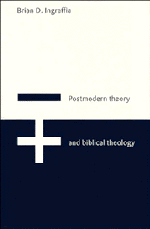Book contents
- Frontmatter
- Contents
- Acknowledgements
- List of abbreviations
- Note on translations of the Bible
- Introduction: postmodernism, ontotheology, and Christianity
- 1 NIETZSCHE'S MOCKERY: THE REJECTION OF TRANSCENDENCE
- II HEIDEGGER'S FORGETTING: THE SECULARIZATION OF BIBLICAL ANTHROPOLOGY
- III DERRIDA'S DENIALS: THE DECONSTRUCTION OF ONTOTHEOLOGY
- Conclusion: ontotheology, negative theology, and the theology of the cross
- Notes
- Bibliography
- Index
Introduction: postmodernism, ontotheology, and Christianity
Published online by Cambridge University Press: 01 June 2011
- Frontmatter
- Contents
- Acknowledgements
- List of abbreviations
- Note on translations of the Bible
- Introduction: postmodernism, ontotheology, and Christianity
- 1 NIETZSCHE'S MOCKERY: THE REJECTION OF TRANSCENDENCE
- II HEIDEGGER'S FORGETTING: THE SECULARIZATION OF BIBLICAL ANTHROPOLOGY
- III DERRIDA'S DENIALS: THE DECONSTRUCTION OF ONTOTHEOLOGY
- Conclusion: ontotheology, negative theology, and the theology of the cross
- Notes
- Bibliography
- Index
Summary
It is necessary to say whom we consider our antithesis: it is the theologians and whatever has theologians' blood in its veins – and that includes our whole philosophy.
Nietzsche, The AntichristChristianity is bereft of the power it had during the Middle Ages to shape history. Its historical significance no longer lies in what it is able to fashion for itself, but in the fact that since the beginning of and throughout the modern age it has continued to be that against which the new freedom – whether expressly or not – must be distinguished.
Heidegger, NietzscheBut it would not mean a single step outside of metaphysics if nothing more than a new motif of “return to finitude,” of “God's death,” etc., were the result of this move. It is that conceptuality and that problematics that must be deconstructed. They belong to the onto-theology they fight against.
Derrida, Of GrammatologyTHE MODERNIST GROUND OF POSTMODERN THEORY
In this study I seek to analyze critically the antipathy exhibited in postmodern theory toward theology. Whereas modernism tried to elevate man into God's place, postmodern theory seeks to destroy or deconstruct the very place and attributes of God. Heidegger uncovers the originality of postmodern thought in his description of Nietzsche's transvaluation: “With the downfall of the highest values also comes the elimination of the ‘above’ and the ‘high’ and the ‘beyond,’ the former place in which values could be posited” (N IV 49).
- Type
- Chapter
- Information
- Postmodern Theory and Biblical TheologyVanquishing God's Shadow, pp. 1 - 16Publisher: Cambridge University PressPrint publication year: 1995



